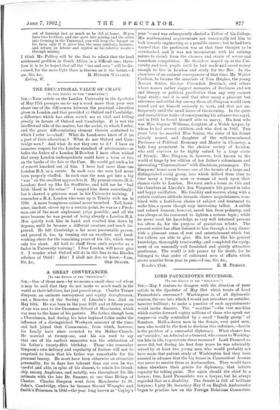A GREAT CONVEYANCER.
[TO THE EDITOR OF THE "SPECTATOR.")
SIR,—One of those men—by no means a small class—of whom it may be said that they do not make so much mark in the world as their inferiors, has just passed away. Charles Turner Simpson, an eminent conveyancer and equity draughtsman, and a Bendier of the Society of Lincoln's Inn, died on May 10th. He was born in the year 1819, and at fifteen years of age was sent to the Grammar School of Manchester, which was near to the home of his parents. His father, though born a Churchman, had during his later boyhood fallen under the influence of a distinguished Wesleyan minister of the time, and had joined that Communion ; from which, however•, his family have since reverted to the Mother-Church. He married at twenty-one, and his son used to say that one of his earliest memories was the celebration of his father's twenty-fifth birthday. Those who remember Simpson's own delicacy and regularity of feature will not be surprised to learn that his father was remarkable for his personal beauty. He must have been otherwise an attractive personality, for in days less tolerant than our own he was careful and able, in spite of his dissent, to retain his friend- ship among Anglicans, and notably, was throughout his life intimate with the late Dr. Sumner, at one time Bishop of Chester. Charles Simpson went from Manchester to St. John's, Cambridge, where he became Second Wrangler and Smith's Prizeman in 1842—the year long known as " Cayley's year "—and was subsequently elected a Fellow of his College. His mathematical acquirements not unnaturally led him to look towards engineering as a possible career; but he had been warned that the profession was at that time thought to be overstocked, and it was not inconsistent with his retiring nature to shrink from the chances and strain of severe and hazardous competition. He therefore stayed up at the Uni- versity and took pupils until he had made and saved money enough to live in London and study for the Bar•. In the chambers of an eminent conveyancer of that time, Mr. Walter Coulson, he became the associate of Tom Hughes, the young Nassau Senior, George Cavendish Bentinck, and others whose names rather suggest memories of liveliness and wit and literary or political proclivities than any very earnest legal study; and it is said that after many a pleasant but otherwise unfruitful day among them all, Simpson would turn round and set himself seriously to work, and that not un- frequently until the small hours of the morning. In the quiet and unambitious walks of conveyancing his advance was rapid, and in 1855 he found himself able to marry. His first wife was Miss Gaynor Williams, daughter of a Welsh lawyer, by whom he had several children, and who died in 1862. Two years later he married Miss Senior, the sister of his friend already named, and daughter of the well-remembered Professor of Political Economy and Master in Chancery, a lady long prominent in the choicer• society of London, who still survives to be highly valued by a large circle of friends. Mrs. Simpson is, however, best known to the world at large by her edition of her father's voluminous and interesting "Conversations" with illustrious personages. The Simpsons' house soon became one of the haunts of a large and distinguished social group, into which drifted from time to time many a foreign man or woman of mark upon their chance visits to London. Between such a home as this and his chambers at Lincoln's Inn Simpson's life passed in calm and happy oscillation. His timidity and reserve, along with a certain cautious attitude towards chance acquaintances, com- bined with a fastidious choice of subject and treatment to make him a sparse though very interesting talker. A subtle and refined humour•, however, saved him from pedantry, and was always at his command to lighten a serious topic; while he never• used his knowledge, as very well informed persons too often do, for the purpose of gratuitous rebuke. The present writer has often listened to him through a long dinner with a pleasant sense of rest and entertainment which but few talkers are able to give. His law was like his general knowledge, thoroughly trustworthy, and completed the equip- ment of an unusually well furnished and quietly attractive gentleman. The world is left poorer by his death, for he belonged to that order of cultivated men of affairs which grows scantier from year to year.—I am, Sir, &c.,






































 Previous page
Previous page